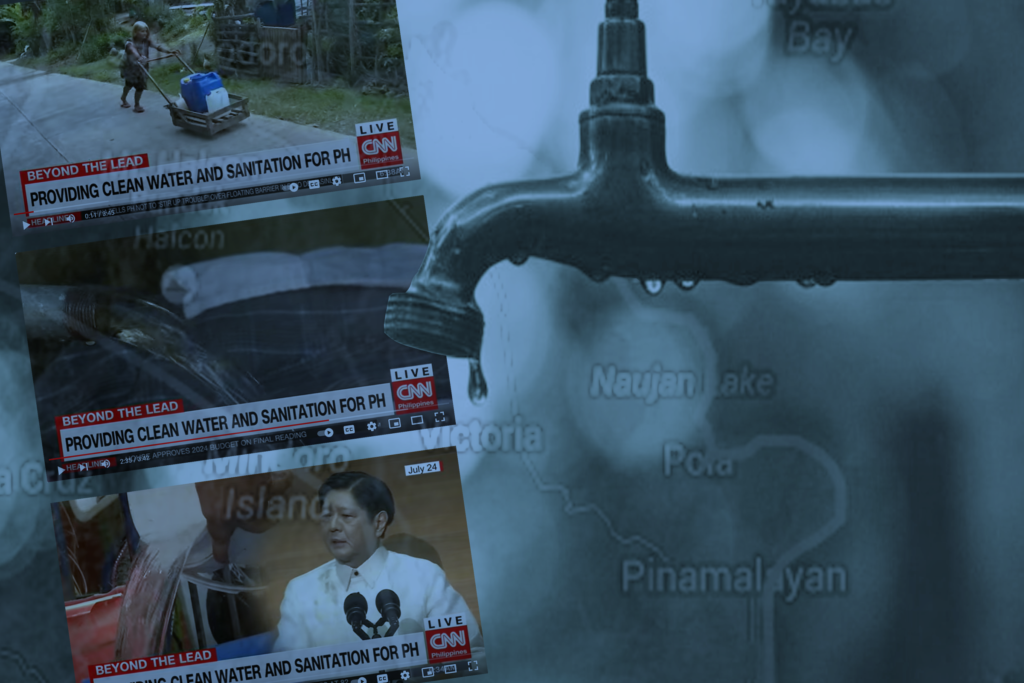CNN Philippines reveals more Filipinos without enough water supply

CHEERS TO CNN Philippines for a special report that put the spotlight on the ongoing water and sanitation crisis in Pola, Oriental Mindoro. Gerg Cahiles, in a three-part special report, called attention to the decades-long plight of the residents and the government’s promise to alleviate it.
What’s the Story
Aired from September 27 to 29 and as part of the ‘Beyond the Lead’ segment, the report showed that the actual situation in Pola is a “far cry” from government claim that nine out of 10 households in the country have clean water supply. It’s the exact opposite in Pola — the report showed that only one out of 10 household has piped water supply.
The first part captured the plight of the residents in different barangays. The second part showed the varying sides of the actors involved in the issue – the water district, the Local Water Utilities Administration (LWUA), and the local government. The first two parts discussed the complex issue, requiring national government’s focus and action. The third part reviewed the national government’s promise and its plans to supposedly meet the target of 95 percent Filipinos having secure water supply by 2022.
What the Report Got Right
Cahiles tackled a problem that has worsened through the decades, made even more severe by the oil spill from the tanker MT Princess Empress last February. Cahiles visited various barangays in Pola, capturing the tedious process by which residents “make ways to get by” amid the water crisis: relying on the river and the spring, manually and daily fetching water from distant areas, and washing clothes by the tank sheltered only by a makeshift roof.
Cahiles revealed the poor condition of the water system that had not been improved or rehabilitated for more than eight decades. Various officials informed him about the state of neglect. The water district’s limited supply prevented it to serve far-flung areas; as well as the indebtedness of the water district to the LWUA, a government-owned and controlled corporation that oversees water distributors in the provinces. The report showed that the water district would need PHP 27.35 million to rehabilitate itself, which is more than its combined five-year collection. While LWUA can provide more loans, Pola Mayor Jennifer Cruz did not favor going further in debt, saying “Another utang, so another tubo nila ito (another loan, so another profit of theirs.”
Cahiles also sought the perspective of a water security specialist, Allison Woodruff of the Asian Development Bank, who said that the national government can come in and include the private sector for the rehabilitation.
The report recalled water security as one of the President’s priority measures. In his State of the Nation Address in July 2023, Marcos promised that he would give water security a “special focus.” He also issued an executive order creating a dedicated water resources office under the Environment department. Woodruff said that such a “holistic” overview would be a big improvement but added that the government should manage correctly public private partnerships for these to actually deliver.
Cahiles went beyond the scope of Pola, citing government’s master plan and budget allocated for water-related projects. In all parts of the report, he helped the public understand data using visual charts to demonstrate his points.
Cahiles ended his report with the government’s reminder to Filipinos to conserve water amid El Niño. But such an appeal, he sharply added, ”may not make sense to millions of Filipinos without access to clean water.”
Why Is This Important?
The report showed that while most TV reports are limited by airtime and the rush to air on the same day, particular problems outside of Metro Manila are too important to be overlooked. Earlier this year, in February, Cahiles also did a series on the water crisis in Carles, Iloilo which had an impact as more water projects were announced in the town by July. This only proves that when the media gives a closer look into a problem, government can be pressured enough to do what it’s supposed to do.
Clean drinking water and sanitation has long been recognized as a universal human right and media should do their part in calling for government accountability and action when government fails to uphold and fulfill basic human needs.
Leave a Reply